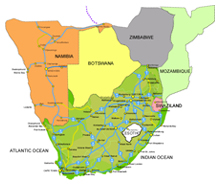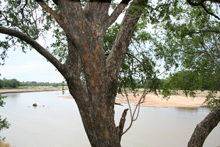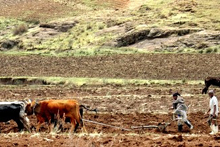Ecological networking in Southern Africa: The ELTOSA experience
Editorial by JC Pauw1, JR Henschel2, AA Sitoe3, JB Chimphamba4, JK Kanyanga5 & S Ringrose6
ELTOSA (the emerging Environmental Long-Term Observatories of Southern Africa), is a facilitating regional forum for the national Environmental Observation Networks (EON) in Southern Africa. ELTOSA was established in 2001 to create synergy among these networks, and to create sufficient critical mass in terms of intellectual and infrastructural capacity.
|
Ecosystems and environmental issues are not constrained by political boundaries. Within ELTOSA, countries are joining forces to increase the effectiveness of regional ecological research and information, particularly of processes that cannot be understood with short-term, small-scale ecological research.
Knowledge of long-term processes and episodic events is gathered through monitoring of critical indicators at EON sites and light can be shed on large-scale processes by comparing data from different regional EON sites. This knowledge and its dissemination may contribute to the strengthening of national environmental policies and decision making for sustainable development.
|
The information and understanding obtained through ELTOSA will support regional natural resource management. In so doing, it will contribute to the battle against poverty by serving to stabilise and enhance livelihood opportunities in Southern Africa. Effective environmental policies resulting in productive environments will in turn strengthen the regional economy region for greater stability and security.
Southern Africa is vulnerable to the impacts of climate change
The 3rd Assessment Report of the Intergovernmental Panel on Climate Change has revealed Southern Africa to be vulnerable to the impacts of climate change. Climate change impacts cannot easily be discerned from those of local forces such as land degradation.
More importantly, when and where these forces manifest together, land degradation and climate change will have the potential to accelerate the pace of desertification in the sub-region, and to increase the impacts of episodic events exponentially.
|
To be able to manage complex and dynamic environments with many interacting factors that vary at different scales, it is necessary to have mechanisms in place for the effective detection and prediction of environmental change. ELTOSA was established as a scientific forum to perform this function by facilitating the understanding of long-term (meaning decades to centuries) and large-scale (from ecosystem level to global level) environmental processes. This involves the identification of appropriate indicators, documentation, analysis and information dissemination concerning long-term large-scale ecological and socio-economic processes. These are elucidated through comparative multi-disciplinary research and monitoring over a network of institutionally operated field observation sites.
Monitoring to detect patterns of change
Southern Africa has particular conditions of water, land and atmosphere that require monitoring to detect patterns of change and to contribute to the knowledge base of ecosystem understanding.
In South Africa land degradation ultimately occurs within the key natural resources of water, soil and vegetation. Anthropogenic pressures on available resources in Botswana, particularly during drought periods, were found to impede the regenerative capacity of the natural vegetation cover. The Limpopo River flood of 2000 ravaged mangrove forests and coastal thickets in Mozambique resulting in large-scale mortality, as well as up to one metre of sand deposition.
|
In the catchments of Lake Chilwa, Malawi, poor vegetation cover and high rainfall kinetic energy jointly promote soil loss and sedimentation, and are increasingly driven by deforestation and conversion of agricultural land to homestead development. Downstream these physico-chemical and hydrological changes affect the migratory and reproductive behaviour of migratory, ecologically and economically important fish species in the lake.
Climate change coupled with land degradation would consequently affect both water and land conditions. Fresh water is critically important to society and environment alike and its sources, pathways, requirements, uses, abuses and conservation need to be monitored and studied intensively, as it is key to understanding the respective roles of climate change and human-driven local changes.
Current land transformation and land-use changes should be studied to capture and understand the environmental context in which climate change is occurring. A recent model shows how aerosol emissions from biomass burning and industrial activities, and its transport via the atmosphere, are also impacted by climatic change, indicating that land-atmosphere exchanges must be included in monitoring programmes.
ELTOSA's monitoring challenges
Given the context of research in Africa, ELTOSA is therefore challenged to identify variables and techniques for monitoring that are particularly suitable to African conditions, as well as low-tech and cost-effective.
Many rural communities dependent on natural resources are subject to the vagaries of an already harsh environment. In addition, the shortage of resources and education that they have to cope with, render them even more vulnerable in the face of potential extreme events caused by climate change and amplified by land degradation.
In many instances solutions are required for politically sensitive trans-boundary issues, such as water management in the Limpopo, Orange, Kunene, Zambezi and Okavango river systems; elephant metapopulation distribution, dynamics and management; ecology and control of alien invasive species; sustainable agro-ecological systems; and the ecological and social impacts of climate change. Complementary socio-economic research and observations are required to address these - indeed, participatory work with rural communities, coupled with awareness and information exchange is an effective way of promoting sustainable development.
Ecosystems and environmental issues permeate political boundaries
The multi-country ELTOSA network hinges on the common observation that ecosystems and environmental issues permeate political boundaries. Within ELTOSA, countries are joining efforts to increase the effectiveness of environmental research and information, particularly of processes that cannot be understood with short-term small-scale ecological research, e.g. climate change, land degradation and desertification.
Knowledge of long-term processes and episodic events is gathered through site-based long-term monitoring will strengthen national environmental policies. The information and understanding obtained through ELTOSA will support regional environmental and natural resource management and thereby stabilise and enhance sustainable development in southern Africa.
Effective environmental policies resulting in productive environments will in turn strengthen the economy of the southern African region. ELTOSA has been making substantial progress in establishing country networks and drafting its founding documentation. It must continue to work for human capacity building and establish continuity and coordinating capacity for it to deliver on its promises.
|














